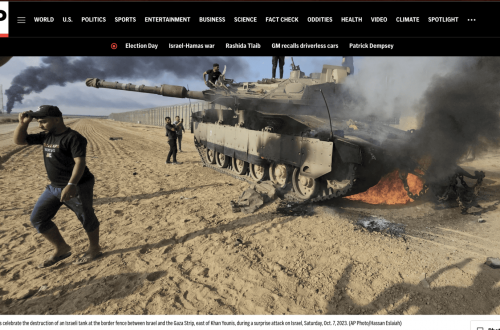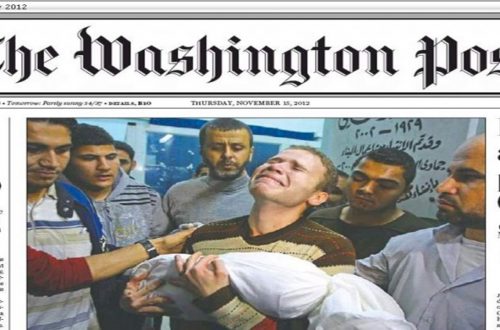Earlier this year, the Institute for Jewish Policy Research polled 4,000 Jews on their views on Israel.
The result is pretty much what you’d expect. British Jews are “committed, concerned and conciliatory:”
Israel – the home to half the world’s Jews – is very important to Jews, with overwhelming majorities both supportive and protective of Israel. Most British Jews back two states. A bare majority backs negotiation with Hamas. An overwhelming majority regard the war against Hamas in Gaza as “a legitimate act of self-defence”, and both believe in land for peace and oppose settlement building.
23% of Jews have seen anti-semitic incident in the last year.
The report is here.
The JC report is here.
This is the executive summary:
Deep ties and strong commitment• For 82% of respondents, Israel plays a ‘central’ or ‘important but not central’ role in their Jewish identities.• 90% believe that Israel is the ‘ancestral homeland’ of the Jewish people.• 95% have visited Israel at some point in the past. In contrast, previous studies reported comparable figures of 91% (2002) and 78% (1995).• 72% categorize themselves as Zionists; 21% do not see themselves as Zionists, and 7% are unsure. Generally speaking, the more religious respondents say they are, the more likely they are to describe themselves as Zionist.• 87% say that Jews in Britain are part of a global Jewish ‘Diaspora’; just 19% regard Jews outside Israel as living in ‘exile’.• Only 31% agree that the State of Israel has a responsibility for ‘ensuring the safety of Jews around the world’. By contrast, 77% of respondents agree that Jews have ‘a special responsibility to support Israel’.• An overwhelming majority (87%) agrees that Jews are responsible for ensuring ‘the survival of Israel’— over half (54%) the non-Zionist respondents also agree.Dovish stance on key policy issues• Two-thirds (67%) favour giving up territory for peace with the Palestinians; 28% disagree. Religious respondents are less likely than secular respondents to agree. Nevertheless, almost half (47%) of all ‘Religious’ respondents agree that Israel should give up territory, as do 76% of the ‘Secular’. Similarly, 62% of self-described Zionists agree, compared to 70% of those who see themselves as non-Zionists.• Almost three-quarters (74%) are opposed to the expansion of existing settlements in the West Bank (Judea/Samaria). Even among those who define themselves as Zionist, 70% are opposed.• A large majority (78%) favours a two-state solution to the conflict with the Palestinians; 15% are opposed, and 8% are undecided.• Just over half (52%) think that Israel should negotiate with Hamas, while 39% do not.Clear support on security issues but with somereservations• Half the sample (50%) agrees that ‘Israeli control of the West Bank (Judea/Samaria) is vital for Israel’s security’, while a sizable minority (40%) disagrees. Religious respondents are more likely to agree than secular respondents.• There is still stronger support (72%) for the view that the security fence/ separation barrier is ‘vital for Israel’s security’. Self-defined Zionist respondents are nearly three times as likely to agree as non-Zionists.• A clear majority (55% against 36%) consider Israel to be ‘an occupying power in the West Bank (Judea/Samaria)’; 9% are uncertain. 48% of self-defined Zionist respondents see Israel as an occupying power.• Most (72%) agree that the Gaza War was ‘a legitimate act of self-defence.’ Religious and Zionist respondents are considerably more likely to agree with this than secular and non-Zionist respondents.• A slight majority (52% against 43%) agrees that the government of Israel has little or no choice in most of the military action it takes.• Fully 87% of respondents agree that ‘Iran represents a threat to Israel’s existence.’ Just over two-thirds (68%) of non-Zionist respondents also agree. Some mixed feelings about the state of Israeli society• A large majority (80%) feels that ‘Democracy is alive and well’ in Israel.• By contrast, 67% agree that ‘there is too much corruption in Israel’s political system.’ Only 13% disagree, while 20% are uncertain.• About three-quarters (74%) think that ‘Orthodox Judaism has too much influence in Israel’s society’. Close to half (45%) of ‘Religious’ respondents also agree with this assertion.• 60% of respondents agree that Jewish minority groups in Israel, such as people of Russian or Ethiopian origin, ‘suffer from discrimination’, and only 20% disagree. Similarly, 56% agree that non-Jewish minority groups ‘suffer from discrimination’ in Israel, while 27% disagree.Some divergence of opinion on the will for peace• A majority (59%) feels that ‘Israel holds less responsibility for the recent failure of the peace process than its neighbours’; a third (34%) disagrees. Religious respondents are more sympathetic towards Israel in this respect than secular respondents. Those with higher level qualifications are more critical.• The majority of those with a view (47% compared with 38%) feels that ‘Most Palestinians want peace with Israel’; 15% are unsure. Secular and non-Zionist respondents are the most likely to agree with the statement.Israel is prominent in the daily lives of Jews in Britain• Over three-quarters (76%) of the sample feel that Israel is relevant to their day-to-day lives in Britain. Even so, 67% do not feel any conflict of loyalty regarding Britain and Israel.• Just over a quarter (26%) say that they ‘feel uncomfortable living in Britain because of events in Israel’. Respondents living in parts of the country with fewer Jews are the most likely to feel uncomfortable.• A majority (60%) says that Israel is either not an issue or only one of several issues that influences their voting behaviour. 36% say that Israel is either ‘the central issue’ or a ‘high priority issue but not central.’Antisemitism• Almost a quarter (23%) of the sample had witnessed some form of antisemitic incident in the previous year. Of these, over half (56%) believe that the incident was ‘probably’ or ‘definitely’ related to the abuser/assailant’s views on Israel.• More than one in ten respondents (11%) said they had been subjected to a verbal antisemitic insult or attack in the 12 months leading up to the survey. Over half of the victims (56%) believe that the incident was ‘probably’ or ‘definitely’ related to the abuser/assailant’s views on Israel.Division of opinion on the right to speak out• Over a third (35%) think that Jewish people should ‘always’ feel free to criticize Israel in the British media; a further 38% say that there are some circumstances when this would be justified. Only a quarter says this is ‘never’ justified.• Just over half (53%) agree that Jews in Britain have the right to judge Israel even though they do not live there; a slightly smaller proportion (45%) think that Jews do not have this right as they do not live there.Religiosity and educational attainment• In general, the more religious respondents reported being, the more hawkish their stance on political and security issues; the more secular they were, the more dovish their stance.• Respondents with higher levels of educational attainment tended to exhibit more dovish stances on political and security issues compared with those with lower levels of educational attainment.


